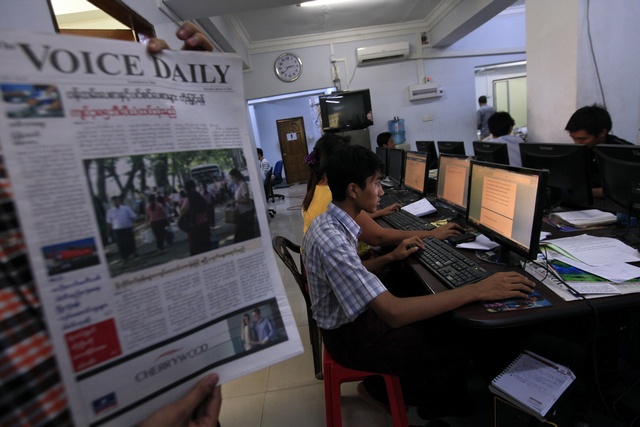The introduction of daily newspaper is likely to fuel myriad challenges for Burma’s budding media, including an increase in self-censorship among editors who fear the government’s draconian media laws, local sources have said.
The warnings come as four private publications went to print for the first time since 1964, when the former military junta prohibited all non-state owned newspapers from publishing daily.
“We have to be careful and we have to be smart until the 1962 [printing and publishing] law has been revoked,” Ko Ko, the publisher of the Yangon Times and General-Secretary of the Myanmar Journalists’ Association told DVB, referring to the draconian legislation, which required all content to be screened by the military’s censorship board.
Although 16 publications, including the Yangon Times, were recently granted permission to publish daily, only four publications hit the newsstands on Monday. Among them were the military-backed party’s paper, the Union, and the leading news journal The Voice.
But many weekly publications are still poorly prepared for the introduction of daily newspapers and some editors fear an increase in self-censorship as long as Burma’s numerous punitive laws remain in place.
“I think [newspapers] can criticise the government – but there is a degree of [acceptable] criticism – and they will have to use their wording in the newspapers very carefully,” said Ko Ko. “But these are very early times; all the newspaper editors and publishers are gradually pushing freedom of speech.”
Recently the government came under fire for introducing a new draft printing and publishing law with eerily similar provisions to the notorious 1962 legislation. A new draft media law that is currently being drafted by Burma’s interim press council has also been criticised by international rights bodies.
“Despite promises of reform, a new press bill drafted by Myanmar’s Press Council retains a vagueness that will leave the print media open to abuse from the government and other powerful actors,” the free speech advocacy group, Article 19, warned in February.
When the government formally abolished pre-censorship in August last year, editors were issued a set of guidelines that warned against criticising the government or threatening national security. According to Ko Ko, the wording in the guidelines is so opaque that editors are likely to proceed with caution.
“The guidelines are too broad, for example where national security is concerned – we don’t exactly know what is concerned with national security,” he said. “So it depends on the editors if they want to take a risk.”
But he added that a new version of the media law has already been drafted, and the controversial printing and publishing law is likely to see “many amendments” before being debated in parliament in June 2013. “The Ministry of Information and the press council are working on that,” he said.
Other editors are concerned about the logistical and financial aspects of running a daily news operation. The chief editor of The Voice Daily, Kyaw Min Swe, said his publication faces many risks by going daily.
“There are a lot of challenges in Burma unlike in other countries,” he told DVB. “We have to pay for all the [printing] equipment and circulation with our own money – unlike foreign countries where you can get financial support from shareholders.
“Also the inadequate transportation system in our country makes it difficult for us to distribute across the country.”
The Chief Editor from Eleven Media Group, Wai Phyo, also warned that pricing would be the biggest challenge for daily newspapers amid booming competition both from online and print media.
“The government can sell their newspaper copies with low price as they have government budgets and state funds, private publications will have to [set higher prices] to cover expenses and also for tax,” Wai Phyo told DVB.
On Saturday, the Associated Press became the first international news agency since the commencement of political reforms in Burma to open a formal bureau in Rangoon. It follows news that foreign journalists are able to obtain one-year media visas in order to report from the former pariah state.
But concerns remain over the safety of journalists after a number of local reporters were attacked by an angry Buddhist mob in central Burma last month for covering an eruption of anti-Muslim violence in Meikhtila. One journalist reportedly had a sword held to his throat, before being forced to hand over his camera’s memory card.
President Thein Sein has been lauded for introducing sweeping democratic reforms in Burma over the past two years, including freeing political prisoners and easing media restrictions. It has been two years to the day since he was sworn into office.



